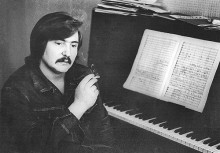The maestro’s family and friends will participate in the concert. Volodymyr Ivasiuk tragically died at 30. But thanks to this extraordinary person, “the song will always be among us.”
According to the event masterminds, charity donations raised at the concert will be used for publishing The Instrumental Works by Volodymyr Ivasiuk.
Let us remind that Ivasiuk created 107 songs, 53 instrumental works, and music for 2 plays. He was a professional medic and violinist, he was excellent at playing piano, cello, guitar, he performed his own songs, was good at drawing and was an excellent speaker.
When leafing through old archives, I came across the transcribed interviews with his father Mykhailo Ivasiuk (b. 1917 – d. 1995), a writer, associate professor of Ukrainian literature at the Chernivtsi National University, and with popular singer Nazarii Yaremchuk (b. 1951 – d. 1995). I think The Day’s readers will find it interesting to learn more about the maestro through memories of people who were the closest to him.
CO-AUTHORS
In the novel The Ballad of a Rider on a White Horse you wrote about the fight of Bukovyna people for a better life in the second half of the 17th century, and you basically depurged the people’s leader Myron Dytynka, by showing that he was not a criminal, as some Moldavian chroniclers had it, but a knight with noble and sublime aspirations. Is it true your son Volodymyr contributed a part of his soul to the writing of this historical novel?
“Yes. It was in 1978, I think. We went on a family vacation to Pitsunda, where I was finishing the work on The Ballad. My wife and kids traveled round the Caucasus Mountains, and I was sitting in my room and writing. Volodia said once: ‘Father, we came here to have a rest together, and you are busy with your manuscript all the time. Let me help you with something. Perhaps, I can write a few pages too. Tell me what the novel is about and what I should be writing about, and what you will write about later.’ I told him the content of the book and the way it was supposed to end. Volodia read the previous chapters and sensed the atmosphere of the writing, so to say. Then he took some notebooks and a pencil, went to the beach and started writing. I did not pay much attention to it, but I did not object to it either. My son wrote Chapters 19 and 20. He showed the text to me after it was finished. I liked it. I only did a bit of editing, expanded the dialogs, typed it, and included in the novel. And I sent it to the publishing house like that. The part written by Volodia, just like the whole Ballad, was in fact printed almost unchanged. The book lived through four reprints (in Ukrainian and Russian). That is why I can say my son co-authored this novel.”
“HE FOUND HIS RED RUE IN THE MOUNTAINS”
The composer also remained in the memories of his colleagues. In particular, in those of popular singer Nazarii Yaremchuk:
“I recall my first meeting with the author of ‘Red Rue.’ Volodymyr was young, sturdy, with handsome and proud Hutsul features. High color brought out the fun and observant sparks in his eyes, which were blue like the sky after a thunderstorm. His thick brown hair fell down freely hanging over those eyes. The hard chin line suggested a strong and determined personality.
“However, meeting and getting to know him exceeded all my expectations. The specific features of his character impressed me for the rest of my life: he never exposed himself immediately, never brought an avalanche of information and intellectual conclusions down on his interlocutor’s head. He carried me away to his unique human world, slowly revealing the unexpected corners of his soul, which was in love with mountains and people, and he left the more unexpected and desired for later. Having never fully opened up, he left not a slightest reason to know him in all his complexity.
“He found his red rue in the mountains, it will burn forever in human hearts as an eternal fire of his generous and kind soul, his fascination and love... Volodia wrote almost all of the orchestral pieces himself. He used to say: ‘The way a song sounds depends on how you dress it.’ He was especially fond of writing music for woodwind instruments: oboe, flute, and bassoon. There were tomes for orchestrating large symphonic bands on his grand piano during our rehearsals.
“Volodymyr Ivasiuk lived in four dimensions. He was a poet, a composer, an artist, and an amazing person!”
Let us remind that on May 18, 1979, Ivasiuk was found hanged in the Briukhovytsky Forest near Lviv. The official version, suicide, was doubted by the public. Ivasiuk’s funeral on May 22, 1979, turned into a mass protest rally against the Soviet government.
The records of the Ivasiuk case were marked as confidential and kept in Moscow. The composer’s relatives still think that he was murdered. On January 26, 2009, the Prosecutor General of Ukraine renewed the criminal case on Ivasiuk’s death, which was long closed. The composer was posthumously awarded the title Hero of Ukraine in 2009.







